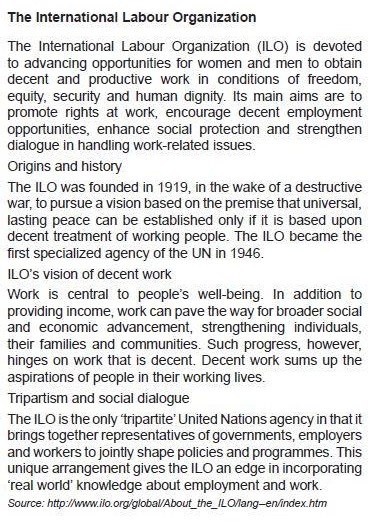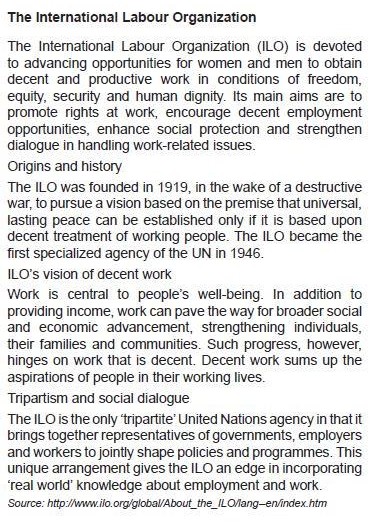Sobre as experiências de reformas administrativas em nosso país, é correto afi rmar:
Nos casos em que um gestor público, visando ao planejamento estratégico de sua organização, necessite realizar uma análise de cenário com base nas forças e fraquezas oriundas do ambiente interno, bem como nas oportunidades e ameaças oriundas do ambiente externo, é aconselhável que o faça valendo-se da seguinte ferramenta:
Sobre o ciclo de gestão do governo federal, é correto afi rmar:
A nacionalidade pode ter repercussões na vida de brasileiros e estrangeiros. Nos termos da Constituição Brasileira, é brasileiro nato:
Companies in the rich world are confronted with a rapidly
ageing workforce. Nearly one in three American workers
will be over 50 by 2012, and America is a young country
compared with Japan and Germany. China is also ageing
rapidly, thanks to its one-child policy. This means that
companies will have to learn how to manage older workers
better.
Most companies are remarkably ill-prepared. There was a
fl icker of interest in the problem a few years ago but it was
snuffed out by the recession. The management literature
on older workers is a mere molehill compared with the
mountain devoted to recruiting and retaining the young.
Companies are still stuck with an antiquated model for
dealing with ageing, which assumes that people should
get pay rises and promotions on the basis of age. They
have dealt with the burdens of this model by periodically
"downsizing" older workers or encouraging them to take
early retirement. This has created a dual labour marketfor
older workers, of cosseted insiders on the one hand and
unemployed or retired outsiders on the other.
But this model cannot last. The number of young people,
particularly those with valuable science and engineering
skills, is shrinking. And governments are raising retirement
ages and making it more diffi cult for companies to shed
older workers, in a desperate attempt to cope with their
underfunded pension systems.
Feb 4th 2010 | From The Economist print edition [adapted]
According to the text, businesses
Minister calls for wider fl exible working rights
British government ministers are considering giving all
employees the right to ask for fl exible working hours "from
the beginning" of a new job as part of plans to encourage a
fundamental shift in working habits.
The Work and Pensions Secretary, Yvette Cooper, says her
offi ce is working with employers and organisations such as
the federation of small businesses to draw up new ways of
supporting men as well as women and non-parents as well
as parents working more fl exible hours.
The current rules are limited to parents of children under 16
and carers, and Cooper wants to extend them. "You want
people to offer fl exible working from the beginning and
we need to look again at how the legislation can support
different ways of doing that," she said.
"There will be some areas where it's not possible to fi t
round particular school hours or particular things where the
nature of the businessmakes it hard - but what you need
is the cultural change for everybody to think differently."
Cooper's proposals come as the government announced
that fathers will be given the right to six months' paternity
leave.
There will be a legal right to take the mother's place at
home for the last three months of a nine-month maternity
break; they would receive £123 a week in statutory pay.
Fathers would then be entitled to take a further three
months' unpaid leave. The move was criticised by some
business leaders.
(From: The Guardian, Friday 29 January 2010 -slightly adapted)
The Work and Pensions Secretary
Sobre a teoria do Capital Humano, assinale a opção incorreta.
Atualmente estão se impondo outras formas de vida, não para o conjunto da população, mas sim para uma parte considerável dela. Trata-se de formas de vida similares às conhecidas pelas mulheres nos últimos decênios. Essas formas de vida estão feitas de trabalho a tempo parcial, contratos temporários, trabalhos não retribuídos e voluntários.
(Beck, Ulrich. Un nuevo mundo feliz. La precariedad del trabajo en la era de la globalización. Barcelona: Ediciones Paidós Ibérica, S. A., 2000, p. 102).
Embasado nos pressupostos teóricos do texto, assinale a opção correta.
A correta análise da modernização da Administração Pública brasileira, havida nas últimas décadas, permite chegar às seguintes conclusões, exceto:
A doutrina constitucionalista tem comentado muito sobre os direitos dos trabalhadores garantidos constitucionalmente. Sobre tais direitos, considerando a doutrina de José Afonso da Silva, é correto afi rmar que:
Companies in the rich world are confronted with a rapidly
ageing workforce. Nearly one in three American workers
will be over 50 by 2012, and America is a young country
compared with Japan and Germany. China is also ageing
rapidly, thanks to its one-child policy. This means that
companies will have to learn how to manage older workers
better.
Most companies are remarkably ill-prepared. There was a
fl icker of interest in the problem a few years ago but it was
snuffed out by the recession. The management literature
on older workers is a mere molehill compared with the
mountain devoted to recruiting and retaining the young.
Companies are still stuck with an antiquated model for
dealing with ageing, which assumes that people should
get pay rises and promotions on the basis of age. They
have dealt with the burdens of this model by periodically
"downsizing" older workers or encouraging them to take
early retirement. This has created a dual labour marketfor
older workers, of cosseted insiders on the one hand and
unemployed or retired outsiders on the other.
But this model cannot last. The number of young people,
particularly those with valuable science and engineering
skills, is shrinking. And governments are raising retirement
ages and making it more diffi cult for companies to shed
older workers, in a desperate attempt to cope with their
underfunded pension systems.
Feb 4th 2010 | From The Economist print edition [adapted]
In paragraph 2, the author claims that the recent economic recession has
Minister calls for wider fl exible working rights
British government ministers are considering giving all
employees the right to ask for fl exible working hours "from
the beginning" of a new job as part of plans to encourage a
fundamental shift in working habits.
The Work and Pensions Secretary, Yvette Cooper, says her
offi ce is working with employers and organisations such as
the federation of small businesses to draw up new ways of
supporting men as well as women and non-parents as well
as parents working more fl exible hours.
The current rules are limited to parents of children under 16
and carers, and Cooper wants to extend them. "You want
people to offer fl exible working from the beginning and
we need to look again at how the legislation can support
different ways of doing that," she said.
"There will be some areas where it's not possible to fi t
round particular school hours or particular things where the
nature of the businessmakes it hard - but what you need
is the cultural change for everybody to think differently."
Cooper's proposals come as the government announced
that fathers will be given the right to six months' paternity
leave.
There will be a legal right to take the mother's place at
home for the last three months of a nine-month maternity
break; they would receive £123 a week in statutory pay.
Fathers would then be entitled to take a further three
months' unpaid leave. The move was criticised by some
business leaders.
(From: The Guardian, Friday 29 January 2010 -slightly adapted)
Ms Cooper hopes her new proposals will give more fl exible working hours
Com relação às instituições e o mercado de trabalho, assinale a opção correta.



